Confession to Priests

Faith Check/Greg Youell
[powerpress]
On this Faith Check let’s take a look at a common question: why confess your sins to a priest instead of straight to God?
First, Catholics are encouraged to privately confess our sins to God all the time and every single Mass begins with a penitential rite in which we do exactly this.
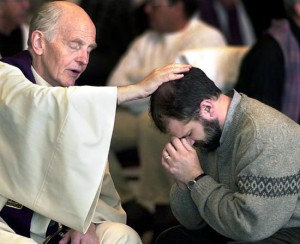 Still we should regularly go to the sacrament of confession or reconciliation. Remember that in the Old Testament a Hebrew was to publicly go to the temple and offer a sacrifice for his sin. In John 20, our Lord gives the apostles authority to forgive sins in his name, when He breathed the Holy Spirit on them and said “whose sins you forgive are forgiven them, and whose sins you retain are retained.†1 In 2 Corinthians Paul also notes that the apostles are Christ’s ambassadors who have been given the ministry of reconciliation.2
Still we should regularly go to the sacrament of confession or reconciliation. Remember that in the Old Testament a Hebrew was to publicly go to the temple and offer a sacrifice for his sin. In John 20, our Lord gives the apostles authority to forgive sins in his name, when He breathed the Holy Spirit on them and said “whose sins you forgive are forgiven them, and whose sins you retain are retained.†1 In 2 Corinthians Paul also notes that the apostles are Christ’s ambassadors who have been given the ministry of reconciliation.2
Early Christian records show that the early Church always understood this according to the Catholic view3:those who sinned gravely after baptism could be reconciled to the Church through confession to the priests, who do not stand as barriers to Christ, but as his ambassadors, who lovingly take us by the hand and restore us to grace after we have fallen.
1 -Â Jn. 20:23
2 -Â 5:18-20
3 – See Catholic Answers website on subject: http://www.catholic.com/library/Confession.asp
Tags: catholic, catholic apologetics, catholic podcast, catholic prayer, cathollc spirituality, confession, penance, reconciliation
This entry was posted on Monday, October 6th, 2014 at 12:01 am
You can follow any responses to this entry through the RSS 2.0 feed.
Sacramentals
[powerpress]
In the minds of non-Catholics, Catholicism often conjures images of Catholic stuff: candles, crucifixes, rosaries, statues, holy water, oils,
and the like. These are called sacramentals—not to be confused with the seven sacraments, they are material items that the Lord uses as conduits of his blessing.
Because of our belief in sacramentals, Catholics have sometimes been accused of practicing magic. But magic is the pagan or new age belief that an object has power in and of itself. Sacramentals are the Christian belief that the living and true God uses His creation as instruments of grace and healing.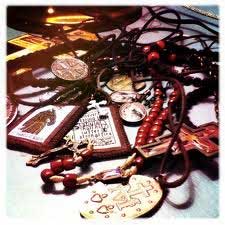
Sacramentals appear all throughout the Scriptures. James speaks of anointing with oil.1 Acts of the Apostles tells us that Paul’s handkerchiefs brought healing power to those they touched.2In the Old Testament, Elisha’s bones were used to bring a dead man back to life.3
And of course the Gospels portray Our Lord himself often using water, mud or even his own spit to perform mighty works of healing and cleansing, a power which Jesus passed on to his priests to be continued to this day.4Â Sacramentals are neither magic nor make believe, but powerful weapons to be utilized in our spiritual journeys.
1 -Â Js. 5:14
2 -Â Acts 19:11-12
3 -Â 2 Kgs. 13:21
4 -Â cf. Mt. 10:7-8; Lk. 10:18-20; Jn. 20:21-23, etc.
Tags: catholic, catholic apologetics, catholic podcast, catholic prayer, cathollc spirituality, sacramentals
This entry was posted on Monday, July 28th, 2014 at 11:56 am
You can follow any responses to this entry through the RSS 2.0 feed.
Born Again in Baptism
[powerpress]
Are you born again? It’s a question that Catholics aren’t quite sure how to respond to, but those who are living out their faith should answer with a whole-hearted Yes.
The term “born again†comes from John 3 when our Lord tells Nicodemus, “Amen, Amen, I say to you, no one can see the kingdom of God without being born from above,â€1 or “born again,†as some translations put it. Nicodemus is confused, thinking that Jesus is referring to a 2nd physical birth, so Jesus clarifies that “no one can enter the kingdom of God without being born of water and Spirit.â€2 The early Church unanimously interpreted this as a reference to the sacrament of baptism, 3 which is no mere symbolic ritual, but the normative instrument that Christ instituted for our spiritual rebirth.
Romans 6 says that in baptism our old natures are buried and we are raised to new life in Christ. 4 And 1 Peter 3:21 puts it plainly, “baptism now saves you.â€
Salvation is a lifelong process, a race to the finish line. But baptism is where it all begins, where we are born again, if you will.
1 – Jn. 3:3
2 – Jn. 3:5
3 – See Catholic Answers website on subject: http://www.catholic.com/library/Born_Again_in_Baptism.asp
4 – Rom. 6:3-4
Tags: baptism, born again, catholic apologetics, faith, Faith Check
This entry was posted on Sunday, December 1st, 2013 at 7:26 am
You can follow any responses to this entry through the RSS 2.0 feed.
Works of the Law
[powerpress]
In Romans and Galatians, St. Paul warns about those trying to justify themselves before God by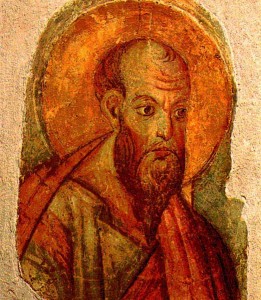 following the works of the Law.Â
following the works of the Law.Â
To properly understand this, we must look at the historical context. As we read in the Acts, there was a group in the early Church called the “Judaizers,â€1 which taught that Gentile converts to Christianity must be circumcised and follow the kosher laws.
Paul says in no uncertain terms that those trying to be saved through these Old Testament works of the Law have rejected Christ and lost their salvation.
The attitude of the Judaizers is contrasted with the faith of Abraham,2 who trusted and obeyed God even to the point of offering his own son, Isaac. Paul’s point is not that our works have no bearing on our salvation, but rather that these particular Jewish rituals were not necessary for eternal life.
For the same Romans that teaches “a man is justified by faith apart from works of the law,â€3 also says that God “shows no partiality … [for] he will render to everyone according to his works..†4
There is no contradiction, as long as we correctly understand what Paul meant by the works of the law.
1 -Â cf. Acts 15:1-6, etc.
2 -Â Rom. 4:1ff
3 -Â 3:28
4 -Â 2:6-10
Tags: catholic apologetics, eternal life, faith, Faith Check, law, st. paul, works
This entry was posted on Monday, November 25th, 2013 at 7:06 am
You can follow any responses to this entry through the RSS 2.0 feed.
Canon of Scripture
[powerpress]
On this Faith Check, let’s talk a little about how we got God’s Holy Word.
The early Christians relied on the Greek translation of the Old Testament, which is the version most often quoted in the New Testament and the one Jesus probably heard growing up. This version also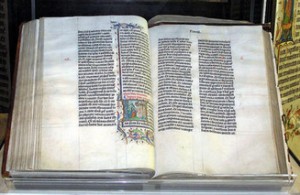 includes the books that Protestants call the “Apocrypha†and typically don’t include in their Bibles.
includes the books that Protestants call the “Apocrypha†and typically don’t include in their Bibles.
It took a while for the Catholic Church to compile the New Testament. Some books such as the 4 gospels were accepted by all, and others, such as the spurious gospels one hears about in The DaVinci Code were rejected by all. However, other books were completely orthodox but disputed, including some that weren’t ultimately included such as The Didache and others that were like Hebrews and Revelation.
The “canonâ€, which is the list of books that belong in the Bible, was determined primarily to say which books could and could not be read at the liturgy, and was largely settled by a series of Church councils approved by the Pope and bishops in the late 300s.1
Hence, when you trust in the inspiration of the Bible, you are trusting a Spirit-led decision of the Roman Catholic Church.
1 -Â Council of Rome under Pope St. Damasus I [A.D. 382], Council of Hippo [A.D. 393], Council of Carthage [A.D. 397],
Epistle of Pope St. Innocent I to Bishop Exuperius [A.D. 405]
Tags: canon of scripture, catholic apologetics, catholic church, Faith Check, New Testament, old testament, sacred scripture
This entry was posted on Thursday, October 31st, 2013 at 4:37 am
You can follow any responses to this entry through the RSS 2.0 feed.
Reliability of Oral Tradition
[powerpress]
In the modern world, oral means of communication are deemed inherently unreliable as we’ve all heard of the game of telephone where a phrase is whispered around a circle and it comes out nothing like the original.
But scholars have shown that in the ancient world, and to this day in some places, oral traditions were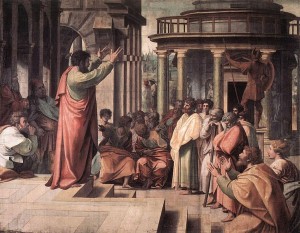 memorized and passed down to multiple generations without alteration.1
memorized and passed down to multiple generations without alteration.1
When the apostles went out to teach the Faith, they did not whisper it in secret, but proclaimed it publicly to the multitudes. Oral tradition was the normative means of passing on the faith, as St. Paul’s says in 2 Timothy 2:2, “what you have heard from me before many witnesses entrust to faithful men who will be able to teach others also.â€
There is no evidence that a widespread change in belief took place among the early Christians. Quite the opposite, at the end of the second century St. Irenaeus wrote that while the Church had spread over the entire known world, the Faith had been maintained in tact everywhere,2 something only attributable to the Holy Spirit.
1 -Â e.g., . Kenneth Bailey, “Informal, Controlled, Oral Tradition and the Synoptic Gospels” Asia Journal of Theology, 5.1
(1991)
2 -Â Against Heresies 1:10:2 [ca. A.D. 180]
Tags: Against Heresies, apostles, catholic apologetics, faith, Faith Check, oral tradition
This entry was posted on Tuesday, October 22nd, 2013 at 4:23 pm
You can follow any responses to this entry through the RSS 2.0 feed.
The Place of the Bible in the Church
[powerpress]
You know, as Catholics we believe that the Bible is God’s Holy and Inspired Word.
However, we don’t hold that our Lord intended the Bible alone to be our sole teacher in the Christian faith.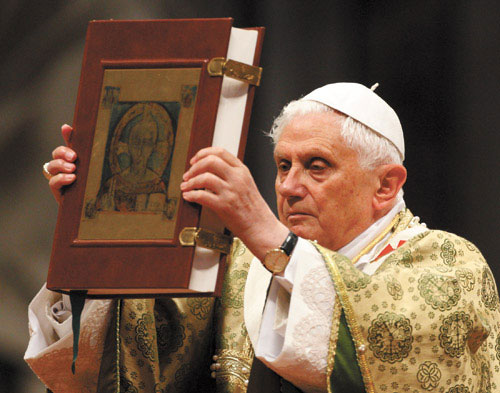
Just think how easily the meaning of our e-mails can be misinterpreted, sometimes causing great strife between people. Then take the Bible, which is infinitely longer, more complex, and written over a millennia ago in a world very different from our own, and we can begin to see why Jesus wouldn’t leave His teaching to just a book.
The Church looks to what it calls Sacred Tradition—which is rooted in things like Church Councils, Creeds, and the early Fathers of the Church—to safeguard our interpretation of God’s Word. All of the Catholic Church’s beliefs can be traced back to the earliest Christians.
Our Lord also chose the twelve apostles to go out and make disciples of all nations1 and promised them the assistance of the Holy Spirit.2 The apostles ordained bishops who have succeeded them down to this present day.3 The Catholic Church is a living voice that rings out for all to hear, proclaiming and interpreting God’s Word to every generation.4
1 -Â Mt. 28:20
2 -Â Jn. 14:26
3 -Â cf. Acts 14:23; 1 Tim. 3:1-8; 2 Tim. 1:6; 2:2; Tit. 1:5; Js. 5:14; 1 Pt. 5:1; Jd. 8ff
4 -Â cf. 1 Tim. 3:15; Mt. 16:18
Tags: bible, catholic apologetics, catholic church, Church, Faith Check, holy spirit
This entry was posted on Tuesday, October 15th, 2013 at 12:35 am
You can follow any responses to this entry through the RSS 2.0 feed.
Church Authority to Interpret the Bible
[powerpress]
Many say that the Bible alone is all we need to know God’s Truth. But just look at all of the questions that
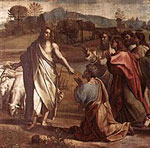 divide Christians today because of differing views over what the Bible teaches: Should infants be baptized?, can I lose my salvation?, or what about the many moral issues that we face?
divide Christians today because of differing views over what the Bible teaches: Should infants be baptized?, can I lose my salvation?, or what about the many moral issues that we face?
Our Lord said that a house divided cannot stand, and He never intended for His followers to interpret the Bible privately (2 Pet. 1:20). Jesus left us a visible Church whose leaders have authority to teach and govern God’s people.
In Matthew 18, Jesus said that insurmountable debates should be taken to the Church for resolution.1 For those that understand this and still refuse to listen to the Church, Jesus has a stern warning. Of course, to follow Jesus’ teaching on this necessarily requires a single Church that is organized and consistent.
For 2,000 years the Catholic Church has been fulfilling this role in order that the Body of Christ might experience the harmony of being truly unified in heart and mind. Small wonder St. Augustine said, “I would not believe in the Gospel myself if the authority of the Catholic Church did not influence me to do so.” 2
1 – Mt. 18:15-18
2 – Against the letter of Mani, 5,6, 397 A.D.
Tags: catholic apologetics, catholic church, Church, church authority, Faith Check, heart, Jesus
This entry was posted on Monday, September 9th, 2013 at 6:54 am
You can follow any responses to this entry through the RSS 2.0 feed.
Holy Eucharist
[powerpress]
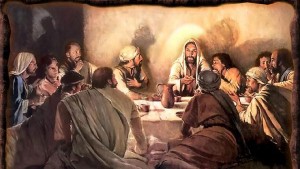 On this faith check let’s talk about the Holy Eucharist.
On this faith check let’s talk about the Holy Eucharist.
Catholics believe that the bread and wine are more than just symbolic reminders. By the power of God working through the priest they are transformed into Christ’s Body and Blood.
Our Lord taught, “Unless you eat the flesh of the Son of Man and drink His blood you do not have life within you.â€1 The Jews scoffed at this and asked, “How can He give us his flesh to eat.â€Â Even His disciples said this was a hard saying and many stopped following Him.
Now when genuine misunderstandings occurred, Jesus corrected His listeners. But Jesus meant what He said, and did not back down: “[M]y flesh is food indeed and my blood is drink indeed … He who eats my flesh and drinks my blood has eternal life, and I will raise him up at the last day.â€
For 2,000 years the Eucharist has been the heart of the Catholic Faith. In fact, the early Christians said, “without the Eucharist we cannot live,†preferring to risk their lives rather than miss Mass. Today He invites each one of us to receive His very flesh and blood.
1-Â All citations from John 6:50 – 58
Tags: catholic apologetics, Catholic Faith, eternal life, eucharist, faith, holy eucharist
This entry was posted on Wednesday, September 4th, 2013 at 12:19 am
You can follow any responses to this entry through the RSS 2.0 feed.
Mary Our Mother
[powerpress]
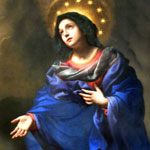 On this faith check let’s talk about why Catholics believe the Virgin Mary is not just Jesus’ mother, but our mother too.
On this faith check let’s talk about why Catholics believe the Virgin Mary is not just Jesus’ mother, but our mother too.
It was during the crucifixion in St. John 19 that Our Lord looked down at Mary and the apostle John at the foot of the cross and said to Mary, “Woman behold your son,†and to John, “Behold your mother.â€Â 1
Bear in mind here that Jesus is suffering the pains of the cross—He must be doing something bigger than simply asking John to watch after his Mother.  John here is a representative of all of Jesus’ followers, and Jesus is giving his mother to all of us.
In Revelation 12 John describes his vision of a “woman clothed with the sun,†2 who brings forth a male child to rule the nations and defeat the ancient dragon who is the devil.  Verse 17 says that the offspring of this woman are those who keep God’s commandments and bear testimony to Jesus.
Friends, God has given us Mary, the Woman chosen from all eternity, 3 to be our spiritual mother and draw us closer to her son, our Lord Jesus Christ.
1Â -Â Â Jn. 19:26-27
2Â -Â Â Rev. 12:1
3Â -Â Â cf. Gen. 3:15, Is. 7:14; Jer. 31:22, etc.
Tags: catholic apologetics, faith, Jesus, Lord Jesus Christ, mother
This entry was posted on Monday, August 5th, 2013 at 7:49 am
You can follow any responses to this entry through the RSS 2.0 feed.
Keys of the Kingdom
[powerpress “faith-check-with-greg-youell”]
Many of our separated brothers and sisters ask where we find a “pope†in the Bible. One example is in St. Matthew 16, where Jesus says to Peter, “I will give you the keys of the kingdom of heaven.â€1
In the ancient world, kingdoms would have a leader underneath the king who was responsible for the administration of the government—we might call them the prime ministers. We find an example of this in Isaiah 22,2 when God declares that Shebna, the Prime Minister of Israel, will be deposed for his sins and replaced by Eliakim, whom God says will be a father to Israel and will carry the key of the house of David—“what he opens none shall shut; and what he shuts none shall open.â€
When Jesus gave Peter the keys in Matthew 16, the apostles already understood their significance. Peter was to be their leader, the prime minister that will shepherd Christ’s Church. “Whatever you bind on earth shall be bound in heaven, and whatever you loose on earth shall be loosed in heaven.â€3
What a gift we have in Pope Benedict, who still carries the keys today.
1 -Â Mt. 16:19
2 -Â see Is. 22: 20-25
3 -Â Mt. 16:19
Tags: apologetics, catholic, catholic apologetics, catholic podcast, catholic prayer, cathollc spirituality, keys of the kingdom, papcy
This entry was posted on Tuesday, May 22nd, 2012 at 12:15 am
You can follow any responses to this entry through the RSS 2.0 feed.
Contraception vs. Natural Family Planning (NFP)
[powerpress “faith-check-with-greg-youell”]
 The question is often asked why the Church is against birth control if it allows natural family planning to avoid pregnancy?
The question is often asked why the Church is against birth control if it allows natural family planning to avoid pregnancy?
The Catholic teaching that it is a sin to use contraception is nothing new but is the perennial teaching of Judeo-Christian morality. Only in the 1930s did any Christians begin teaching that contraception could be morally acceptable.1
The sexual union between husband and wife is a renewal of the wedding vows, which say that “I love you, freely, totally, faithfully, and fruitfully.â€Â To come together sexually while deliberately sterilizing the act goes against the intrinsic meaning of intercourse. It says, “I love you, but not your fertility.â€
When a couple has discerned that there are serious reasons to avoid a pregnancy, there is nothing sinful about periodic abstinence during the fertile times of the month. Intercourse remains a renewal of the marriage vows, a total gift of self that is open to the authentic, life-giving meaning of sex.
Divorce rates among couples using natural family planning are almost non-existent because they grow in self-control and respect for one another’s bodies, which leads to healthier relationships and even more passionate intimacy.
1 – Protestant acceptance of contraception first began at the Church of England’s Lambeth Conference in 1930.
Tags: catholic, catholic apologetics, catholic podcast, catholic prayer, cathollc spirituality, Contraception, human reproduction, natural family planning
This entry was posted on Friday, August 19th, 2011 at 7:57 am
You can follow any responses to this entry through the RSS 2.0 feed.
Fr. Robert Barron’s “Catholicism: a journey to the heart of the faith” is wonderful.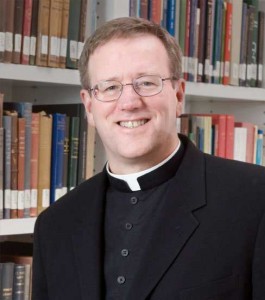 Â AÂ beautiful exploration of the Roman Catholic faith and it’s gift to the world and to culture.
 A beautiful exploration of the Roman Catholic faith and it’s gift to the world and to culture.
[powerpress]
From randomhouse.com
What is the Catholicism? A 2,000 living tradition? A worldview? A way of life? A relationship? A mystery? In Catholicism Father Robert Barron examines all these questions and more, seeking to capture the body, heart and mind of the Catholic faith.
Starting from the essential foundation of Jesus Christ’s incarnation, life, and teaching, Father Barron moves through the defining elements of Catholicism – from sacraments, worship, and prayer, to Mary, the Apostles, and Saints, to grace, salvation, heaven, and hell – using his distinct and dynamic grasp of art, literature, architecture, personal stories, Scripture, theology, philosophy, and history to present the Church to the world.
Paired with his documentary film series of the same title, Catholicism is an intimate journey, capturing “The Catholic Thing†in all its depth and beauty. Eclectic, unique, and inspiring, Father Barron brings the faith to life for a new generation, in a style that is both faithful to timeless truths, while simultaneously speaking in the language of contemporary life.
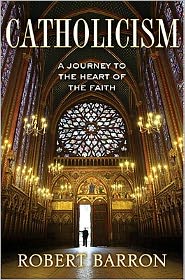 Â Find out more about the book Fr. Barron’s website : Â wordonfire.org
 Find out more about the book Fr. Barron’s website :  wordonfire.org
Tags: catholic, catholic apologetics, catholic apologist, catholic podcast, catholic prayer, cathollc spirituality, faith, fr. robert barron, heart, image books, random house, Robert Barron Catholicism, Roman Catholic, word on fire
This entry was posted on Monday, August 8th, 2011 at 7:52 am
You can follow any responses to this entry through the RSS 2.0 feed.
The wonderful Michael Barber has posted this on Youtube from “The Sacred Page“. Sit back, relax and take occassional notes from a most excellent professor! Â Be sure to visit the original post for more fantastic information from Michael!
Tags: catholic, catholic apologetics, catholic podcast, catholic prayer, cathollc spirituality
This entry was posted on Tuesday, July 19th, 2011 at 10:14 pm
You can follow any responses to this entry through the RSS 2.0 feed.
Tags: blessed mother, blessed virgin mary, catholic, catholic apologetics, catholic podcast, catholic prayer, cathollc spirituality, mary, saints
This entry was posted on Monday, July 18th, 2011 at 2:39 pm
You can follow any responses to this entry through the RSS 2.0 feed.
